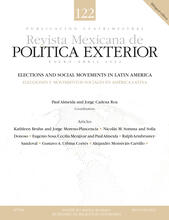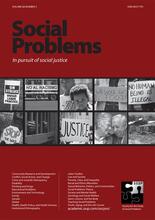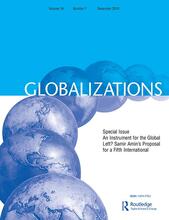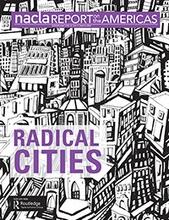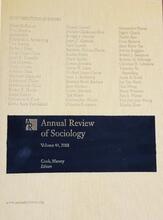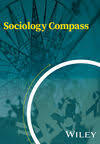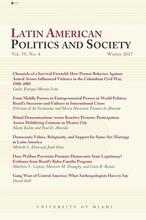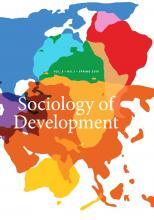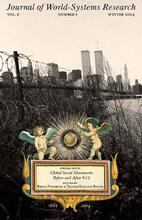Publications by Type: Journal Article
2022
2021
The paper examines the individual-level building blocks of getting out the vote (GOTV) for electoral parties that represent subaltern sectors in resource scarce environments. Drawing on theories of protest waves, social movement fields, and threat-induced collective action, we examine the likelihood of campaigning in left party electoral mobilization and party identification. The study implements a modified version of the Caught in the Act of Protest: Contextualizing Contestation (CCC) survey protocol and respondent selection design. We use a sympathy pool sample of over 1,200 May Day participants in Costa Rica, El Salvador, and Honduras to explain the micro-foundations of electoral proselytizing of political parties advocating for disadvantaged populations. We found that involvement in left party electoral campaigning was largely driven by resources deposited during anti-neoliberal protest waves, including prior movement-type protest, civic organizational activity, and economic threat perceptions. Campaigning for the anti-neoliberal party was also associated with a higher level of post-election party identification. The findings suggest that left parties may at times partially overcome economic and political resource deficits by mobilizing individuals deeply embedded in the social movement field.
2019
2018
A growing body of scholarship acknowledges the increasing influence of global forces on social institutions and societies on multiple scales. We focus here on the role of globalization processes in shaping collective action and social movements. Three areas of global change and movements are examined: first, long-term global trends and collective action; second, research on national and local challenges to economic globalization, including backlash movements and the types of economic liberalization measures most associated with inducing oppositional movements; and third, the emergence of contemporary transnational social movements. In each of these arenas we address debates on diffusion, intervening mechanisms, and the outcomes of collective mobilization in response to global pressures.
The disciplinary fields of immigration and social movements have largely developed as two distinct subareas of sociology. Scholars contend that immigrant rights, compared to other movements, have been given less attention in social movement research. Studies of immigrant-based movements in recent decades have reached a stage whereby we can now assess how immigrant movement scholarship informs the general social movement literature in several areas. In this article, we show the contributions of empiricalstudies of immigrant movements in four primary arenas: (a) emergence; (b) participation; (c) framing; and (d) outcomes. Contemporary immigrant struggles offer social movement scholarship opportunities to incorporate these campaigns and enhance current theories and concepts as earlier protest waves advanced studies of collective action.
2017
Using an innovative survey of protest participants and nonparticipants from five major street demonstrations in Mexico City in 2011 and 2012, this study tests the assumption that influences on protest participation vary across different types of events; namely, ritual demonstrations and reactive protests. The comparison is based on two assumptions: that these are two of the dominant forms of protest in contemporary Latin America, and that specifying the context for different types of social movement participation provides a better understanding of the individual mobilization process for groups seeking to defend their rights or gain new benefits. The comparative analyses reveal some crucial differences. Political interest and previous political experience are more influential in the decision to take part in reactive demonstrations. For ritual demonstrations, the decision to participate tends to be driven more by personal and organizational connections.
2015
The mass mobilizations against neoliberal reforms are rooted in the weakening of the state-led development model and the erosion of social citizenship rights. At the same time, infrastructures created by the developmental state provide the organizational capacity to resist market-driven globalization. The study develops a conceptual framework for understanding the major arenas of state-led development in the twentieth century in relation to the infrastructures and organizations that mobilize social movement campaigns against neoliberalism in the twenty-first century. Special attention is given to public education, health care, public utilities, state subsidies, and transportation networks as laying the foundation for civil society’s ability to collectively defend social protections granted in the preglobalization era in the global South.
Historical shifts in global economic formations shape the strategies of resistance movements in the global South. Neoliberal forms of economic development over the past thirty years in Central America have weakened traditional actors sponsoring popular mobilization such as labor unions and rural cooperatives. At the same time, the free market reforms produced new threats to economic livelihood and well-being throughout the region. The neoliberal measures that have generated the greatest levels of mass discontent include rising prices, privatization, labor flexibility laws, mining projects, and free trade. This article analyzes the role of emerging anti-neoliberal political parties in alliance with popular movements in Central America. Countries with already existing strong anti-systemic parties in the initial phases of the global turn to neoliberalism in the late twentieth century resulted in more efficacious manifestations of social movement partyism in the twenty-first century resisting free market globalization.


